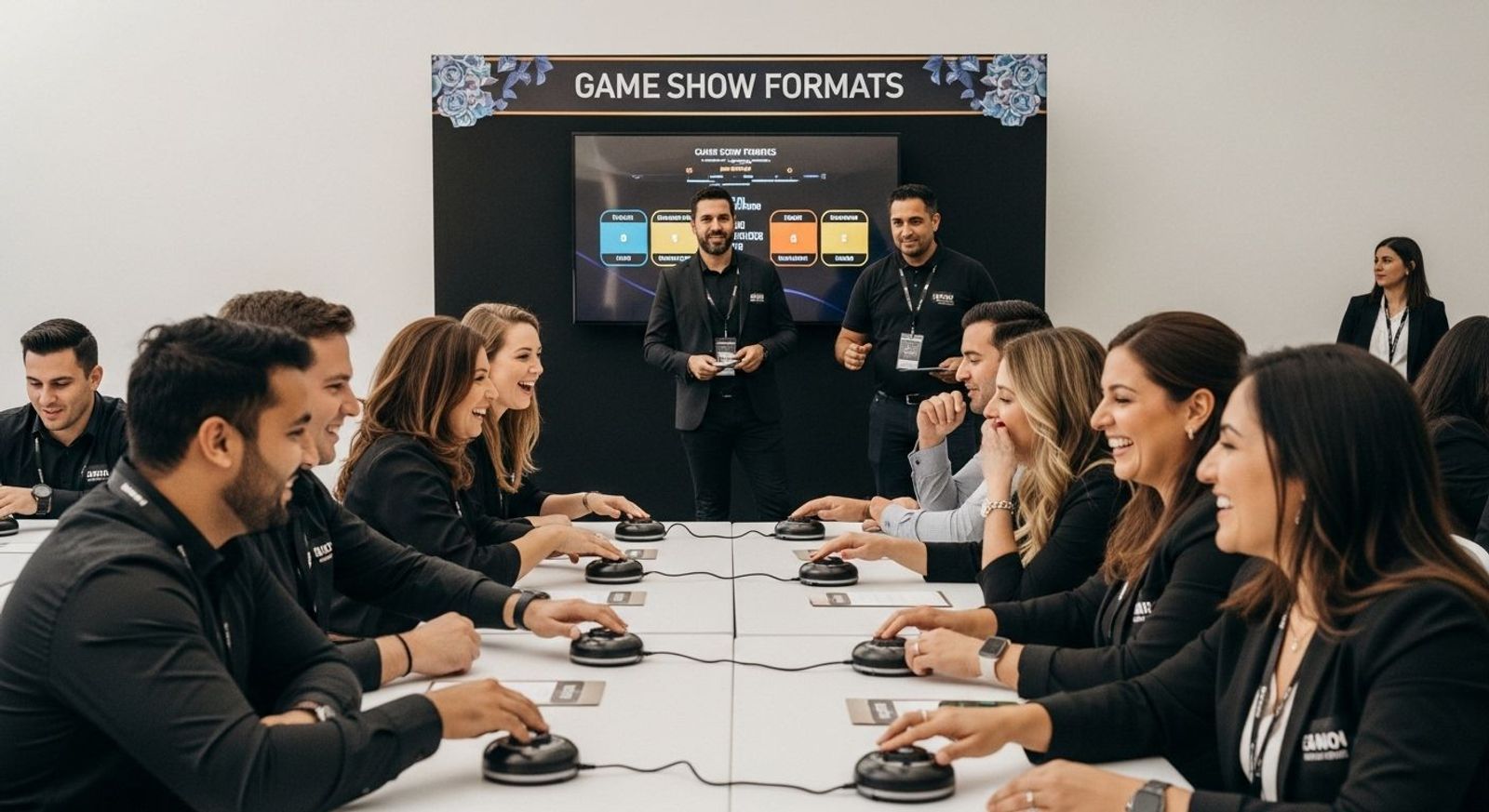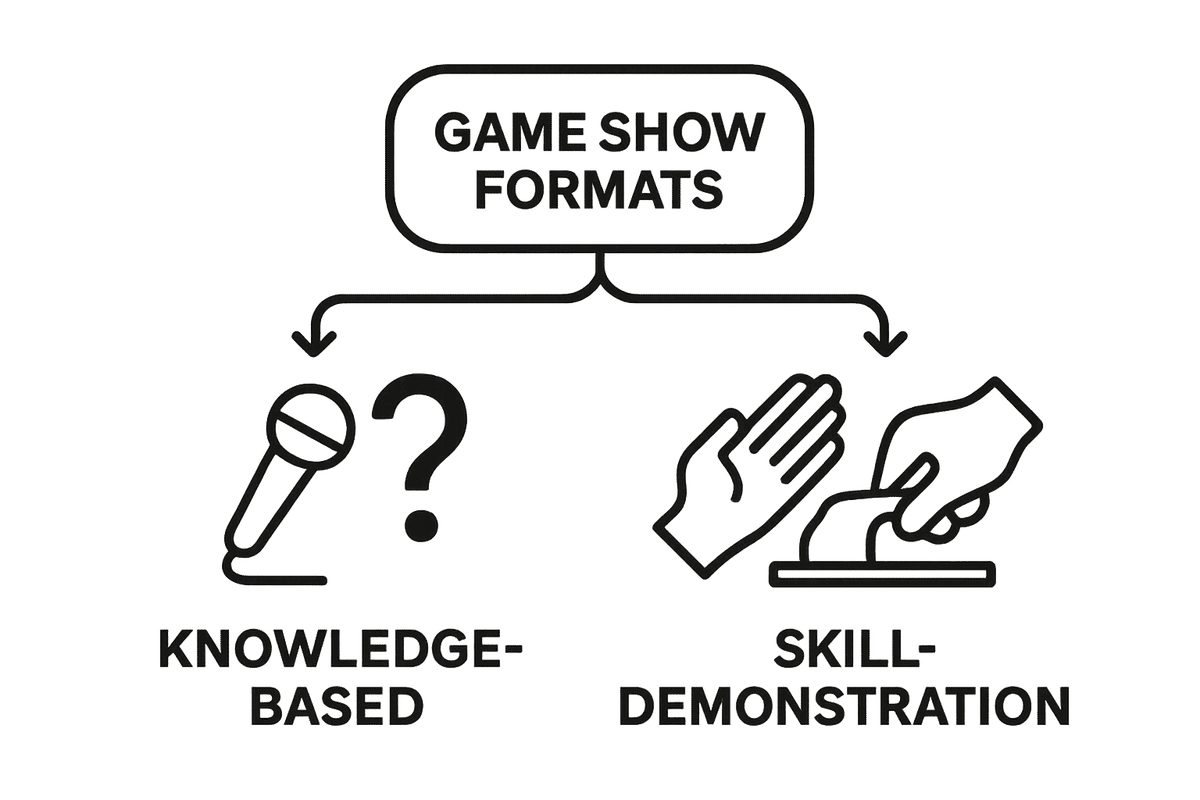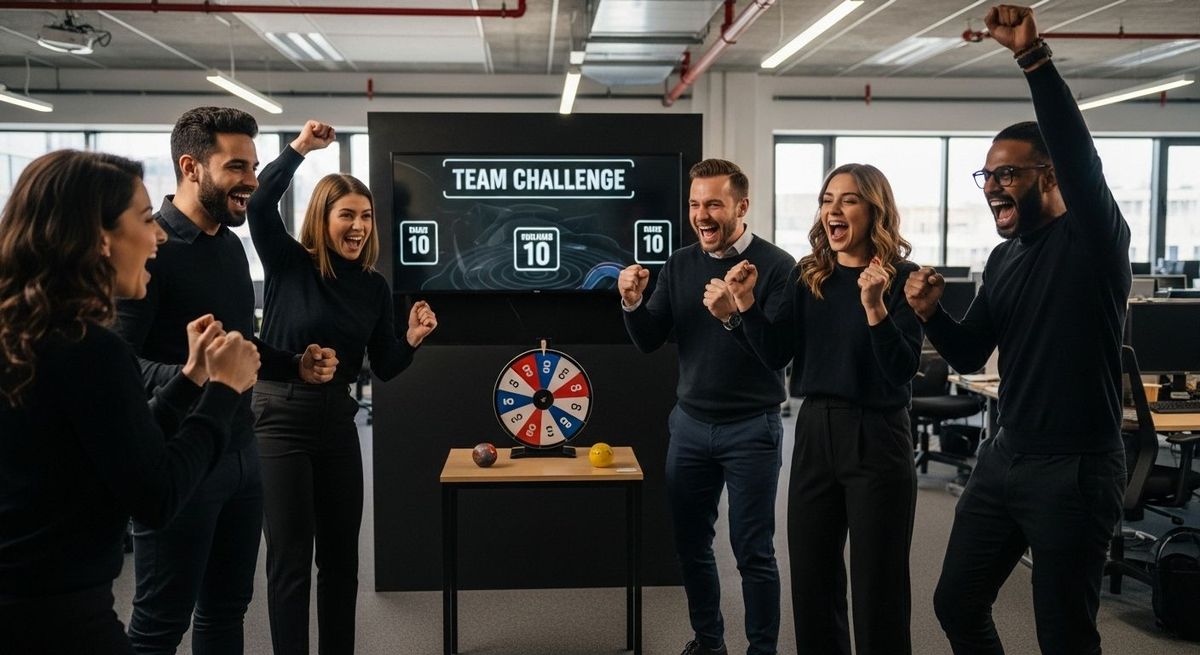Professional Bar Trivia SoftwareFor Venues & Events
- Players join via QR code — no app download
- 6 round types: Buzzer Race, Everyone Answers & more
- Rich media questions with images, video & audio
- Real-time scoring & leaderboards on the big screen
Understanding Examples of Game Show Formats for Events
September 30, 2025

Game show formats are everywhere, from TV screens to corporate meeting rooms, changing the way people learn and connect. Picture this. Organizations using interactive game show formats have reported engagement levels jumping by over 60 percent compared to traditional training. Most people think of game shows as simple entertainment, but their real power lies in how they spark teamwork, encourage fast learning, and turn routine tasks into memorable experiences.
Table of Contents
- What Are Game Show Formats And Their Purpose?
- The Importance Of Game Show Formats In Engagement
- Key Types Of Game Show Formats Explained
- How Game Show Formats Foster Team Dynamics
- Real-World Applications Of Game Show Formats In Organizations
Quick Summary
| Takeaway | Explanation |
|---|---|
| Game shows enhance engagement and learning. | These formats create immersive experiences that actively involve participants, increasing retention and skill acquisition. |
| Structured competition fosters collaboration. | Game shows break down barriers and promote teamwork by engaging participants in shared challenges and goals. |
| Immediate feedback boosts skill development. | Participants receive real-time insights during challenges, facilitating quicker learning and motivation. |
| Adapting formats to various contexts is effective. | Game show formats can be utilized in corporate training, education, and recruitment, making them versatile tools for engagement. |
| Psychological motivations enhance participation. | Elements like competition and recognition tap into intrinsic motivations, ensuring sustained interest and involvement. |
What Are Game Show Formats and Their Purpose?
Game show formats are structured entertainment competitions designed to engage participants through interactive challenges, tests of knowledge, and skill-based activities. These formats transform traditional learning and team interactions into dynamic, exciting experiences that capture audience attention while promoting active participation.
The Core Mechanics of Game Show Formats
At their fundamental level, game show formats represent carefully designed frameworks that establish clear rules, objectives, and reward mechanisms. Researchers in entertainment studies have identified several key characteristics that define these competitive environments:
- Structured competition with predefined rules
- Clear scoring or evaluation mechanisms
- Interactive challenges testing specific skills
- Immediate feedback and potential rewards
- Engaging narrative or thematic elements
Psychological and Organizational Benefits
Game show formats extend far beyond mere entertainment. Organizations increasingly recognize these structured competitions as powerful tools for team building, skills assessment, and knowledge transfer. By introducing elements of playful competition, these formats can:
- Reduce workplace stress through engaging interactions
- Encourage collaborative problem solving
- Assess individual and team capabilities in low-pressure environments
- Stimulate creative thinking and strategic planning
Understanding these formats provides insights into how structured play can transform professional development. Read more about game show engagement strategies to explore how these interactive experiences can revolutionize team dynamics and learning approaches.
The versatility of game show formats allows them to be adapted across various contexts, from corporate training to educational workshops, making them a universally appealing method of interactive engagement.
The Importance of Game Show Formats in Engagement
Game show formats represent a powerful engagement strategy that transforms traditional interaction models by introducing elements of excitement, competition, and interactive learning. These structured experiences go beyond simple entertainment, serving as sophisticated tools for motivation, skill development, and interpersonal connection.
Psychological Drivers of Engagement
Research from organizational psychology reveals that game show formats tap into fundamental human motivations. They activate intrinsic psychological mechanisms that drive participation and sustained interest. Key psychological drivers include:
- Desire for recognition and achievement
- Natural competitive instincts
- Enjoyment of collaborative challenges
- Immediate feedback and reward systems
- Social validation through team performance
Transforming Learning and Interaction Dynamics
Traditional training and team-building approaches often struggle to maintain participant attention. Game show formats revolutionize this landscape by creating immersive, high-engagement environments. By converting complex learning objectives into interactive challenges, these formats ensure that participants are not passive recipients but active contributors.
The interactive nature of game show formats means participants are emotionally invested, which dramatically increases knowledge retention and skill acquisition. Engagement levels spike when learning feels like an enjoyable experience rather than a mandatory task.
Practical Applications Across Contexts
Game show formats demonstrate remarkable versatility across different organizational settings. Whether in corporate training, educational institutions, or professional development workshops, these formats provide a universal framework for meaningful interaction. Explore innovative quiz engagement techniques to understand how structured play can transform learning experiences.
By reimagining traditional communication and learning models, game show formats offer a dynamic approach to engagement that resonates across diverse audiences and professional environments.
Key Types of Game Show Formats Explained
Game show formats represent diverse interactive frameworks designed to engage participants through structured competitive experiences. These formats vary widely, offering unique approaches to challenge participants and create memorable learning environments.
The table below provides an at-a-glance comparison of the three main types of game show formats explained in this article, summarizing their defining features and typical applications.
| Format Type | Defining Features | Common Applications |
|---|---|---|
| Knowledge-Based Competition | Quiz questions, trivia, progressive difficulty | Corporate training, education |
| Performance & Skill-Demonstration | Role-playing, creative problem-solving | Skills assessment, team-building |
| Interactive Technology-Enhanced | Digital platforms, real-time interaction | Remote participation, hybrid events |

Knowledge-Based Competition Formats
Academic research in entertainment design highlights several distinct knowledge-based game show formats that have proven particularly effective in professional and educational settings:
- Quiz-style competitions testing specific subject knowledge
- Trivia challenges with rapid-fire question sequences
- Academic tournament structures with progressive difficulty levels
- Team-based knowledge challenges
- Individual expert tournaments
Performance and Skill-Demonstration Formats
Beyond traditional question-answer models, some game show formats focus on demonstrating practical skills and performance capabilities. These formats challenge participants to showcase their abilities through complex tasks, problem-solving scenarios, and strategic thinking exercises.
Performance formats often include:
- Role-playing scenarios testing professional competencies
- Simulation-based challenges mimicking real-world conditions
- Creative problem-solving competitions
- Strategic decision-making simulations
- Collaborative team challenge events
Interactive Technology-Enhanced Formats
Modern game show formats increasingly leverage technology to create more immersive and dynamic experiences. Digital platforms transform traditional competition models, enabling real-time interaction, remote participation, and sophisticated scoring mechanisms. Check out our app for interactive quiz experiences to explore cutting-edge engagement technologies.
These technology-enhanced formats blur traditional boundaries between physical and digital interaction, offering unprecedented flexibility in designing engaging competitive experiences. By integrating multimedia elements, real-time feedback, and adaptive challenge structures, these formats represent the future of interactive learning and team engagement.
How Game Show Formats Foster Team Dynamics
Game show formats represent sophisticated tools for transforming team interactions, breaking down communication barriers, and creating environments that naturally encourage collaborative behavior. By introducing structured, enjoyable challenges, these formats help teams develop critical interpersonal skills while maintaining high engagement levels.
Psychological Foundations of Collaborative Play
Research in organizational psychology demonstrates that game show formats tap into fundamental psychological mechanisms that promote teamwork. These mechanisms include:
- Shared goal achievement
- Mutual interdependence
- Positive competitive spirit
- Collective problem solving
- Balanced risk taking
Skill Development Through Interactive Challenges
Game show formats create unique learning environments where teams develop crucial professional competencies. Participants learn to communicate effectively, strategize collectively, and support one another through carefully designed competitive scenarios. These experiences go beyond traditional team-building exercises by providing immediate feedback and creating memorable, emotionally engaging interactions.
The structured nature of these formats ensures that learning occurs naturally, without the perceived pressure of formal training environments. Teams discover their collective strengths and areas for improvement through playful, low-stakes interactions that feel more like entertainment than professional development.
Transforming Team Communication Dynamics
By introducing elements of fun and shared challenge, game show formats help dismantle hierarchical barriers and encourage more open, transparent communication. Learn more about effective teamwork strategies to understand how structured play can revolutionize workplace interactions.
These formats provide a unique platform where team members can interact outside traditional professional roles, discovering collaborative potential through enjoyable, meaningful shared experiences. The result is a more cohesive, communicative, and dynamically integrated team environment.

Real-World Applications of Game Show Formats in Organizations
Game show formats have evolved from entertainment platforms to powerful organizational tools that transform traditional learning, training, and development approaches. Organizations across various sectors are increasingly recognizing the potential of these interactive frameworks to enhance employee engagement, skills acquisition, and collaborative capabilities.
Training and Skills Development
Scientific research in corporate learning demonstrates that game show formats provide exceptional mechanisms for comprehensive skills development. These formats offer unique advantages in professional training environments:
- Accelerated knowledge retention
- Immediate performance feedback
- Reduced learning resistance
- Enhanced motivation through competitive elements
- Measurable skill progression
Recruitment and Assessment Strategies
Modern organizations are reimagining talent identification and evaluation through game show inspired assessment models. Interactive challenge-based assessments replace traditional interview processes, allowing recruiters to observe candidates' real-time problem solving, communication skills, and collaborative potential.
These formats enable organizations to:
- Evaluate practical skills beyond theoretical knowledge
- Assess teamwork and interpersonal dynamics
- Create engaging candidate experiences
- Identify hidden talent potential
- Reduce bias in recruitment processes
Organizational Culture and Communication
Game show formats serve as powerful catalysts for organizational cultural transformation. Explore innovative communication team building techniques to understand how structured interactive experiences can reshape workplace interactions.
By introducing elements of play, challenge, and collective achievement, these formats help break down hierarchical barriers, encourage cross-departmental collaboration, and create shared experiences that transcend traditional organizational boundaries. The result is a more dynamic, communicative, and adaptable organizational ecosystem.
To help clarify how game show formats can be leveraged across different organizational needs, the table below compares three key application areas and highlights their unique benefits.
| Application Area | Key Purpose | Benefits |
|---|---|---|
| Training and Skills Development | Accelerate learning and professional growth | Faster knowledge retention, immediate feedback, higher motivation |
| Recruitment and Assessment | Evaluate candidates and team fit | Real-time skill assessment, unbiased evaluation, engaging candidate experience |
| Organizational Culture and Communication | Foster collaboration and cultural change | Enhanced team communication, break down barriers, create shared experiences |
Bring Game Show Energy to Your Next Event With Quizado
If you are looking to transform ordinary events into unforgettable, interactive experiences, you already know the value of game show formats discussed in this article. Many teams struggle to find activities that truly engage every participant and foster real collaboration, making the search for proven, flexible solutions a priority. When knowledge-based challenges and team-driven competitions are the goal, your group deserves more than a basic quiz.

Now is the perfect moment to revolutionize your team-building with quizado.com. Our platform lets you easily customize and host your own virtual or in-person quiz events, inspired by the best examples of game show formats. Whether you want to spark energy during corporate meetings or create fun experiences for groups in their free time, Quizado delivers interactive entertainment with professional polish. Ready to boost engagement and see real team cohesion? Visit quizado.com today to try our customizable game solutions and start building stronger, happier teams.
Frequently Asked Questions
What are the main types of game show formats used for events?
Game show formats for events typically include knowledge-based competitions, performance and skill-demonstration formats, and interactive technology-enhanced formats. These categories offer varied experiences that can be tailored to suit different objectives and participant engagement levels.
How do game show formats promote team engagement?
Game show formats foster team engagement by introducing elements of competition and collaboration. They create an enjoyable environment where team members work together to solve challenges, enhancing communication and interpersonal skills while making learning fun.
Can game show formats be adapted for different organizational settings?
Yes, game show formats are highly versatile and can be adapted for various organizational settings such as corporate training, educational workshops, and team-building activities. Their structure allows them to meet specific goals in different contexts, making them inclusive and effective.
What are the psychological benefits of using game show formats in training?
Using game show formats in training provides psychological benefits such as reduced stress, increased motivation, and enhanced knowledge retention. Participants engage more actively, allowing them to learn in a fun, low-pressure environment that promotes creativity and teamwork.
Recommended
Start Hosting Bar Trivia Tonight
Try Quizado free — no download needed. Host your first trivia night tonight!

